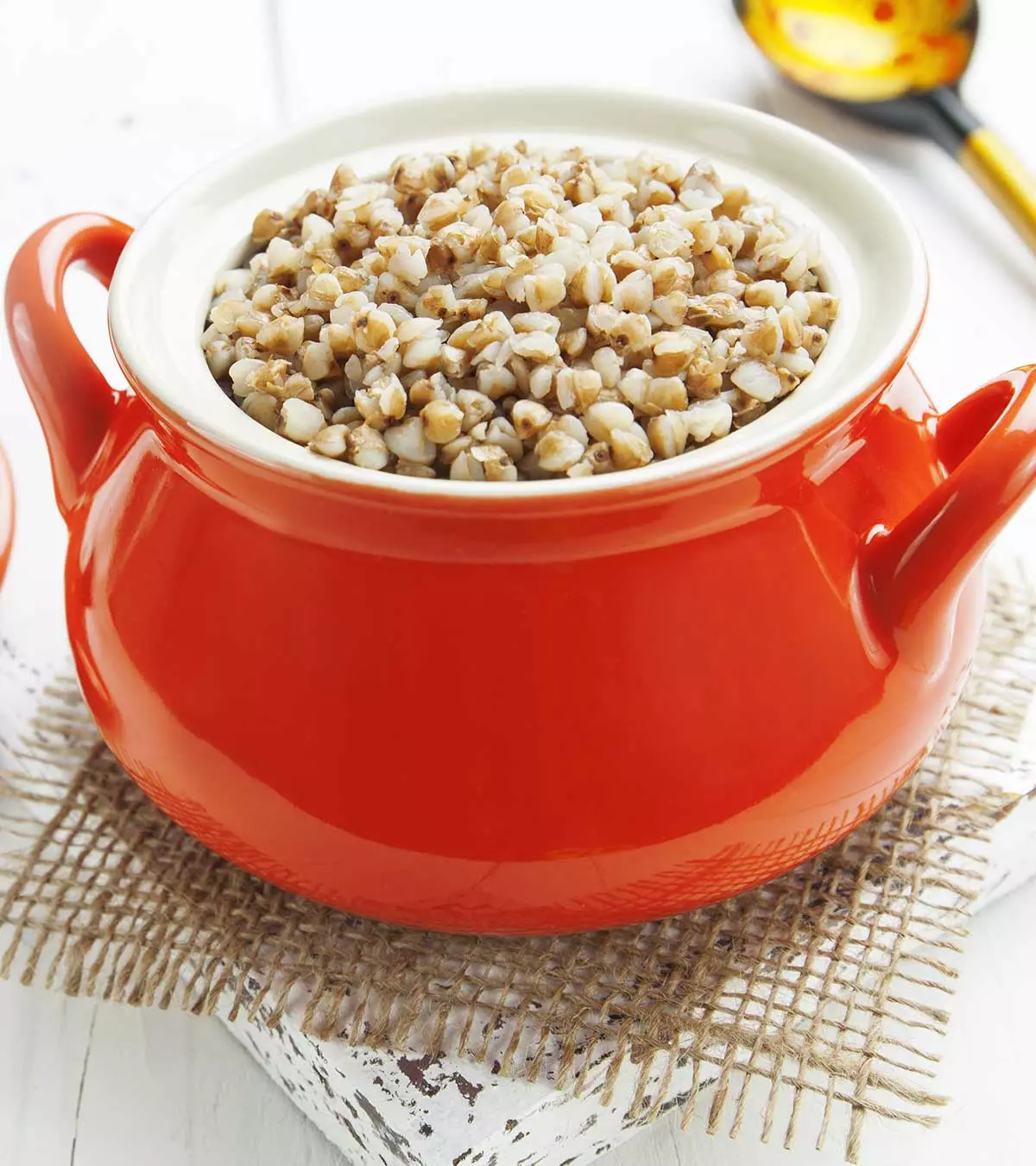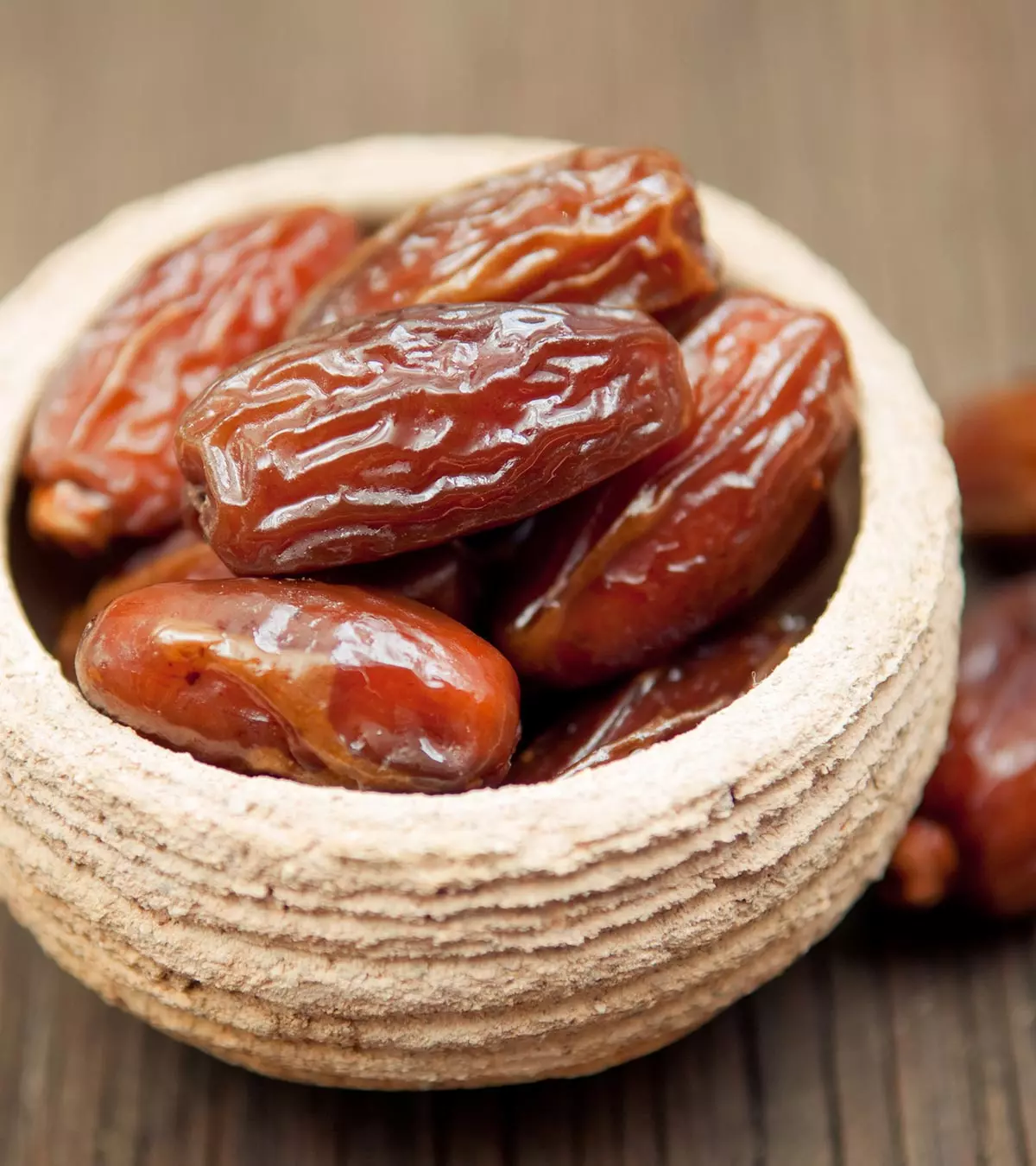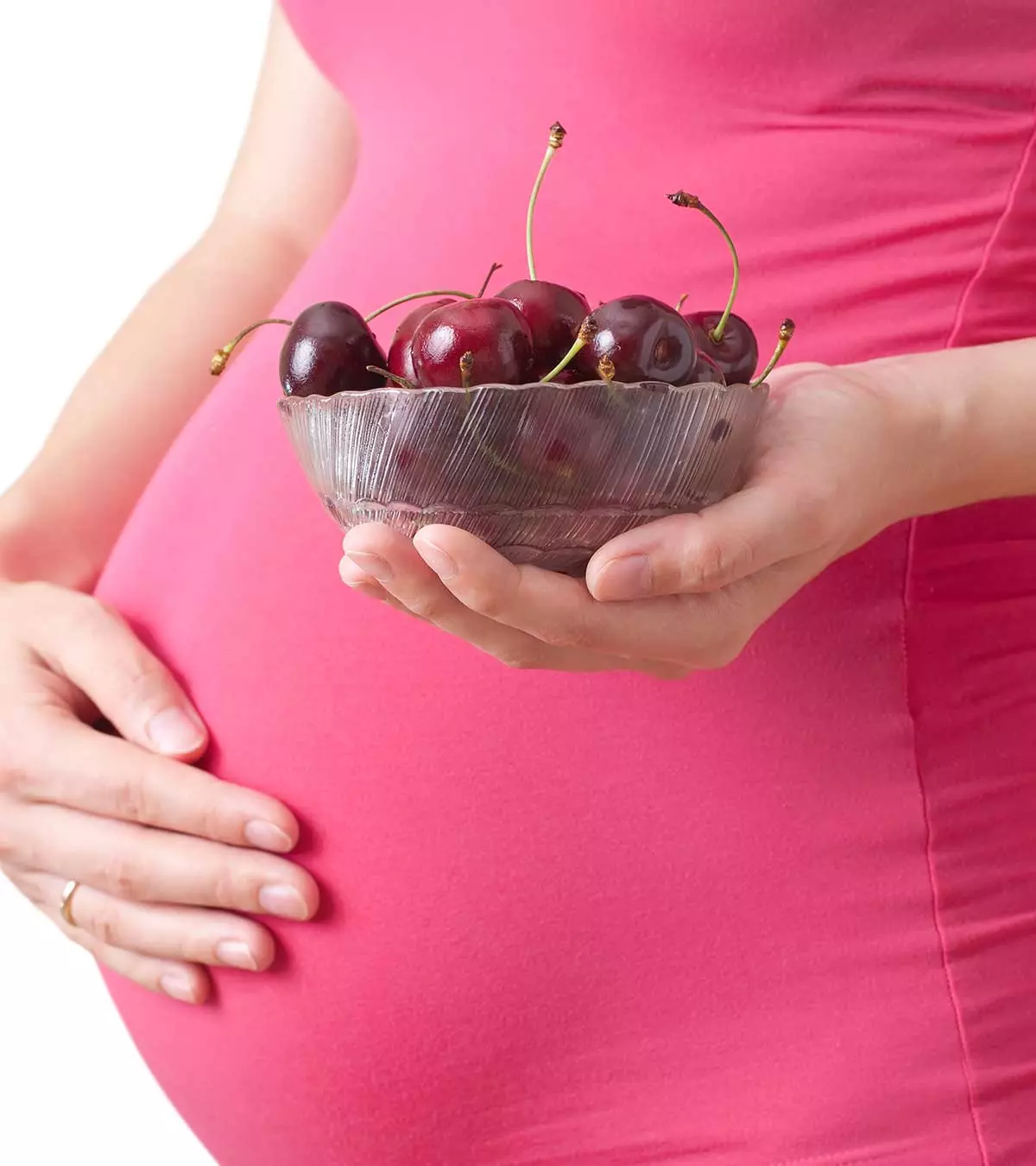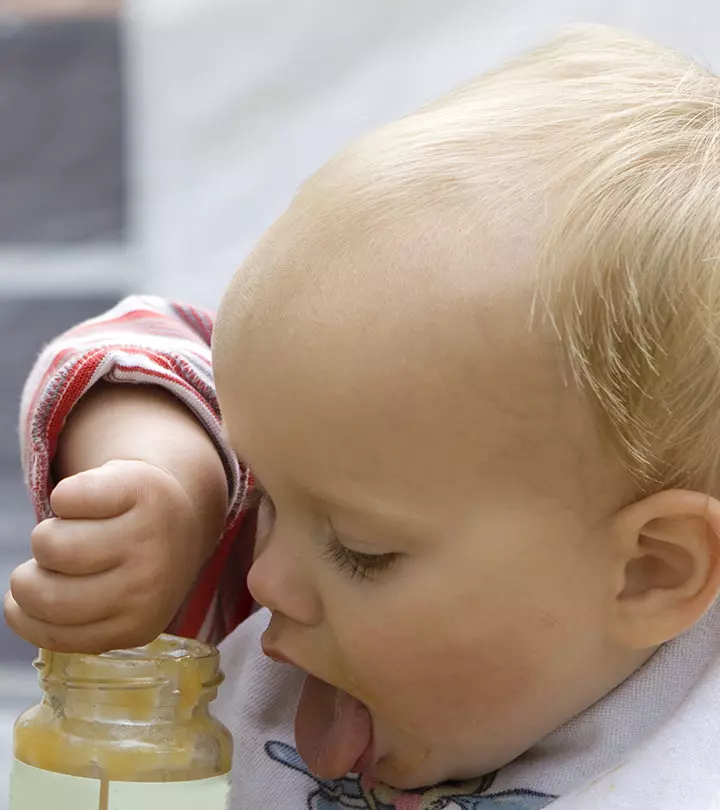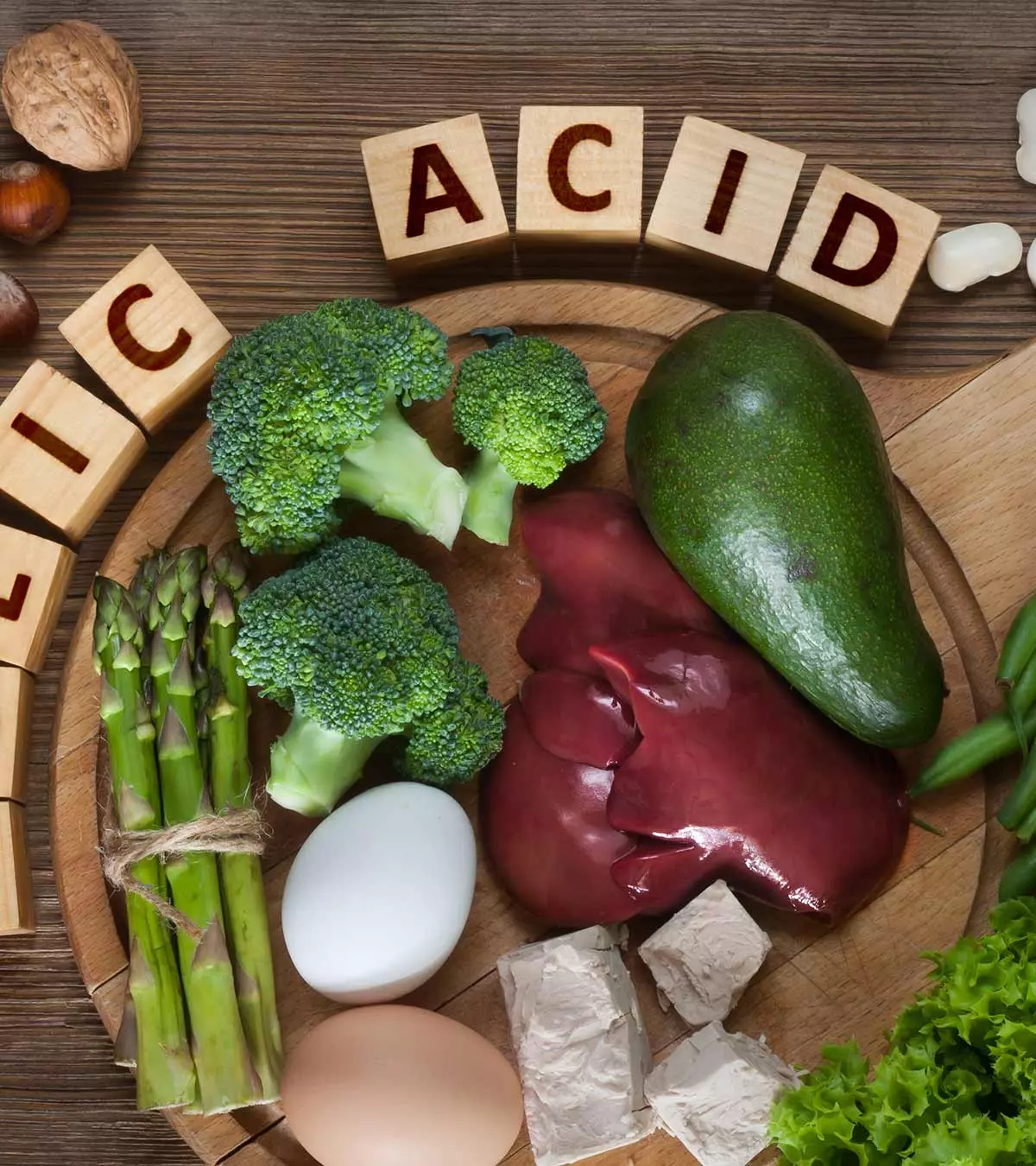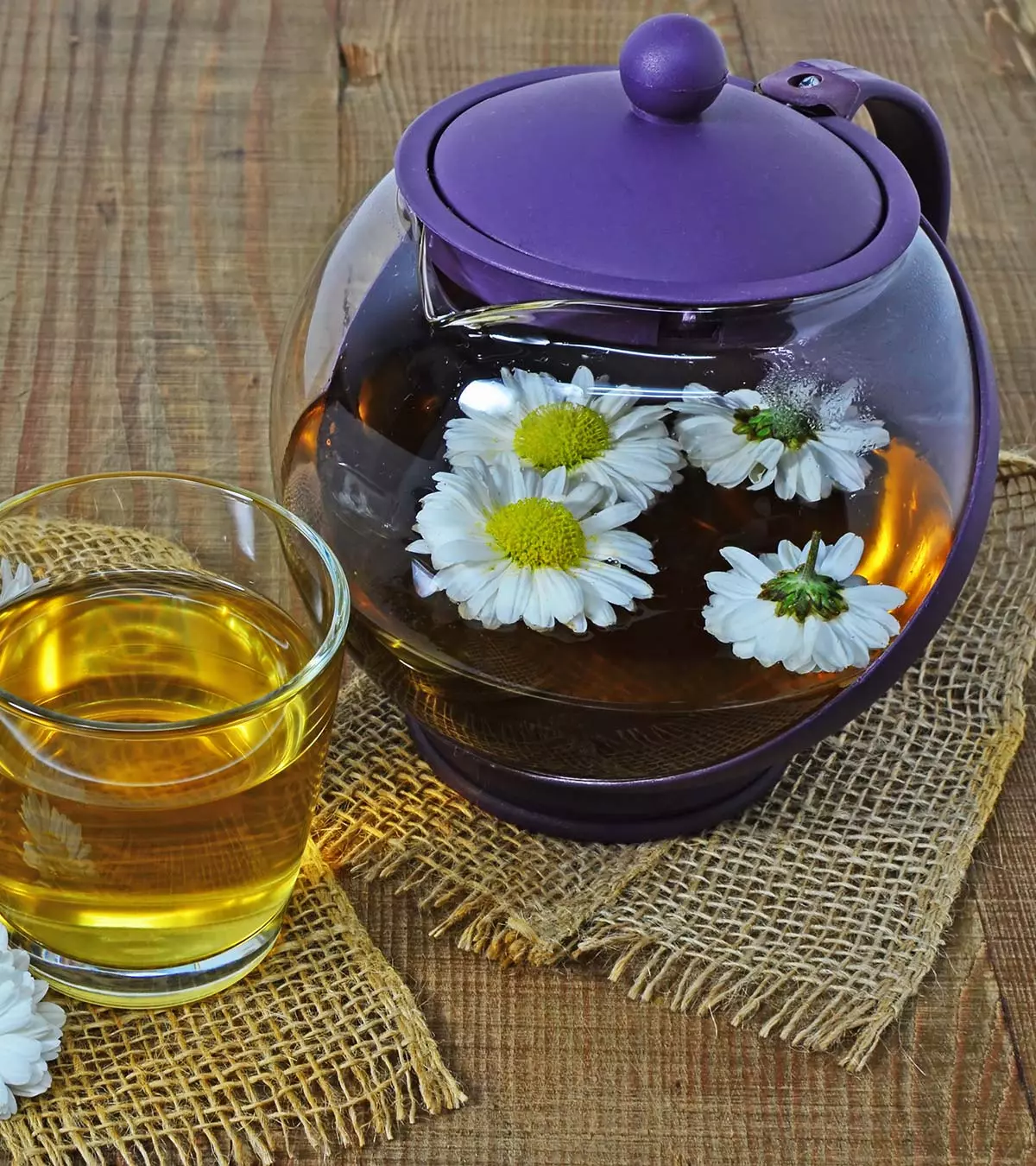
Image: Shutterstock
Chrysanthemum tea is prepared by steeping dried chrysanthemum flowers in hot water. It is used in traditional Chinese medicine as a natural remedy for treating several health conditions. But if you are pregnant, you might want to know if it is safe to drink Chrysanthemum tea during pregnancy.

Research studies have shown mixed results about the safety of herbal teas for maternal health and fetus development. Hence, consumption of herbal teas, such as Chrysanthemum tea, must be done only after you have consulted an expert in prenatal care.
Read on as we tell you more about the safety of Chrysanthemum tea for pregnant women, its possible risks, and how you can prepare it.
 Trivia
TriviaKey Pointers
- It is recommended to consult a professional before consuming chrysanthemum tea during pregnancy as excessive consumption may cause birth defects and contractions.
- Chrysanthemum tea has several benefits such as antioxidants, headache relief, dry eye relief, bone disease treatment, vision improvement, and body cooling in summer.
- However, during pregnancy, it is advisable to limit chrysanthemum tea intake due to potential allergies, drug interactions, harm to the baby, and irritants.
Is It Safe To Drink Chrysanthemum Tea During Pregnancy?

There is not enough research on the safety of drinking chrysanthemum tea during pregnancy. Chrysanthemum tea is commonly recommended to control diabetes and headaches in Chinese medicine (1) and may be suitable for some pregnant women if taken occasionally. However, that is a personal choice, and if you wish to try it, talk to your obstetrician or healthcare professional before doing so.
Can Drinking Chrysanthemum Tea Affect The Fetus?
There is not enough clinical evidence available to ascertain the impact of chrysanthemum tea on the fetus. However, it is believed that consuming chrysanthemum tea may likely lead to abnormal uterine contractions for the mother, which may lead to miscarriage, preterm labor, or low birth weight. Furthermore, it may cross the placenta and harm the baby’s health, possibly causing congenital anomalies.
Why Do Some Pregnant Women Drink Chrysanthemum Tea?

Though there may not be medical backing, chrysanthemum is believed to provide some benefits in general.
- It contains anti-inflammatory compounds, which may help reduce inflammation and varicose veins (2) (3).
- Chrysanthemum extract is believed to help treat bone diseases by regulating bone formation and resorption (4).
- The coolant property of chrysanthemum is likely to cool the body down during summer heat or fever (3).
- It relieves headaches, improves blurred vision, and soothes dry eyes.
- It is a good source of quercitrin and myricetin, which are potent anti-inflammatory and antioxidants.
There isn’t enough evidence to show its effect on pregnant women’s wellness. So, talk to your doctor before consuming chrysanthemum as a maternity drink.
What Are The Risks Of Drinking Chrysanthemum Tea During Pregnancy?
You may have to avoid taking chrysanthemum tea while pregnant for the following reasons:
- If you are allergic to ragweed or daisies, you may also be prone to chrysanthemum allergies. It may result in a rash, hives, redness, swelling, and respiratory discomfort. Also, avoid it if you have any existing health conditions.
- If you are already on some prescription medications, skip this tea as it can suppress the medicine’s actions and effectiveness.

- When taken in excess, it may cross the placenta and affect the baby’s health.
- Chrysanthemum oil contains a chemical called pyrethrum, which is usually used in pesticides, and exposure to the chemical could irritate the skin, mouth, nose, and eyes.
If you have never taken this tea, then it is better not to start during pregnancy. If you do want to try, you should start with small amounts and see if you can tolerate it. You can increase gradually but ensure that you do not go overboard with it. Limit the consumption and stop if you feel uneasy.
 Quick fact
Quick factCan You Drink Chrysanthemum Tea While Breastfeeding?
The effect of chrysanthemum tea during breastfeeding is the same as it is during pregnancy. You can take it in limited amounts in the case of a fever, headache, or itchy eyes.
Does Chrysanthemum Tea Contain Caffeine?
No, chrysanthemum tea is caffeine-free, as it is made from the flower of the Camellia sinensis plant and not its leaves. It may contain caffeine only when blended with other tea leaves, or caffeine-containing ingredients.
Do Chrysanthemum Teas Contain Preservatives?
Pure chrysanthemum tea does not contain any form of preservatives. However, if they are blended with other ingredients, such as black tea or green tea, manufacturers may add certain chemicals as preservatives to increase their longevity.
How To Prepare Chrysanthemum Tea?

Making a cup of chrysanthemum tea is simple. Boil eight ounces of water, and put around three to six dried flowers in it. Allow it to steep for a few minutes until the water turns golden yellow. The tea has a light floral aroma and tastes good even without any sweeteners, but you may add sugar, maple, or agave syrup for extra taste.
Frequently Asked Questions
1. Are chrysanthemum and chamomile the same?
Chrysanthemum (Chrysanthemum morifolium) and Chamomile (Matricaria recutita) are not from the same plants, but both belong to the same plant family, Asteraceae (5).
2. Is it okay to drink chrysanthemum tea every day?
Adequate scientific data is not available to prove the safety of prolonged consumption of chrysanthemum tea. Hence it is advisable to take it in moderation.
3. Can chrysanthemum tea help with high blood pressure during pregnancy?
Chrysanthemum tea may be beneficial in managing high blood pressure during pregnancy. It has been used in traditional Chinese medicine to treat hypertension (7).
4. Can chrysanthemum tea help with anxiety and insomnia during pregnancy?
In herbal medicine, chrysanthemum has been used to treat anxiety by improving relaxation (8). However, it is not a conventional medicine. Therefore, consult your doctor if you wish to use chrysanthemum tea for anxiety or stress relief and insomnia.
5. Can chrysanthemum tea help with cold and flu symptoms during pregnancy?
Chrysanthemum contains vitamins C and A, which may contribute to its immunity-boosting capabilities. It is also believed to reduce the severity of sore throats and colds (7).
6. Can chrysanthemum tea help with skin problems during pregnancy?
Chrysanthemum tea may help improve and maintain skin health during pregnancy. It may be beneficial in reducing skin problems like pimples and acne during pregnancy (7).
7. Can chrysanthemum tea help with digestion during pregnancy?
Moderate consumption of chrysanthemum tea may assist in alleviating digestive concerns by reducing digestive discomfort and stomach-related problems in pregnancy (7).
8. Can chrysanthemum tea help with weight loss during pregnancy?
A study showed that chrysanthemum leaf extract could inhibit obesity in diet-induced obese mice (9). However, weight loss is not recommended during pregnancy. If you sense you are overweight or obese, speak to a doctor to determine appropriate dietary and lifestyle changes.
If you’ve been drinking chrysanthemum tea before becoming pregnant, you can continue to do so occasionally during pregnancy as well, but there isn’t enough data on its safety. Therefore, it’s not recommended to start while pregnant. However, this herbal plant is thought to provide a variety of health benefits to the general population, including nourishment for bone formation and resorption regulation, relaxing and anti-inflammatory effects, and diabetic management. So, whether or not you continue to drink chrysanthemum tea during pregnancy is entirely up to you. However, you should consult your gynecologist or a dietitian before you have any herbal teas during pregnancy.
Infographic: What Are The Risks Of Drinking Chrysanthemum Tea During Pregnancy?
There are several organic teas available in the market. But not all of them are safe for pregnant women. One such tea is chrysanthemum tea. The following infographic highlights a few reasons you should not drink this tea when expecting a baby. Do give it a read.
Some thing wrong with infographic shortcode. please verify shortcode syntax
Illustration: Is It Safe To Drink Chrysanthemum Tea During Pregnancy?

Image: Stable Diffusion/MomJunction Design Team
References
1. The New Art and Science of Pregnancy and Childbirth (Pg 139); by Thiam Chye Tan
2. Luyen BT et al.; Anti-inflammatory components of Chrysanthemum indicum flowers; Bioorg Med ChemLett (2015)
3. The Natural Health Dictionary: Your compfor healing with herbs, nutrition, supplements, and secret remedies by DR. Mao Shing Ni
4. Jong Min Baek et al.; Dual Effect of Chrysanthemum indicum Extract to Stimulate Osteoblast Differentiation and Inhibit Osteoclast Formation and Resorption In Vitro; Evidence-Based Complementary and Alternative Medicine Volume (2014)
5. Chrysanthemum and Chamomile: Flower Teas; Institute of Traditional Medicine, Portland, Oregon
6. Fengjiao Wen, et al.; Identification of natural products as modulators of OATP2B1 using LC-MS/MS to quantify OATP-mediated uptake; Pharmaceutical Biology (2015)
7. M.H Shahrajabian et al.;A Review Of Chrysanthemum, The Eastern Queen In
Traditional Chinese Medicine With Healing Power In Modern Pharmaceutical Sciences;; Applied Ecology And Environmental Research (2019)
8. Sa-Ik Hong et al.; Anxiolytic-Like Effects of Chrysanthemum indicum Aqueous Extract in Mice: Possible Involvement of GABAA Receptors and 5-HT1A Receptors; Biomolecules & Therapeutics (2012)
9. Ri Ryu et al.; Chrysanthemum Leaf Ethanol Extract Prevents Obesity and Metabolic Disease in Diet-Induced Obese Mice via Lipid Mobilization in White Adipose Tissue; Nutrients (2019)
Community Experiences
Join the conversation and become a part of our nurturing community! Share your stories, experiences, and insights to connect with fellow parents.
Read full bio of Sumaiya Patankar
Read full bio of Swati Patwal
Read full bio of Rebecca Malachi
Read full bio of Reshmi Das






